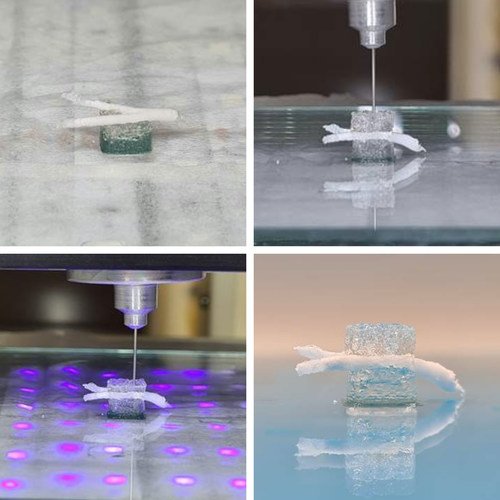Technion Researchers to Develop 3D Bioprinted Vascularized Tissue Constructs
12 October 2021 | Tuesday | News

Printing of patient-specific coronary flap for implantation using rhCollagen-based BioInk. Image from Advanced Materials, 2021, DOI: (10.1002/adma.202102661)
"We are excited with the impressive and innovative work of our collaborators at the Technion," said Yehiel Tal, CollPlant's CEO. "The combination of rhCollagen-based bioink and patient's own cells has the potential to create patient-specific tissues that are suitable for transplantation and eliminate the risk of implant rejection. The results of this study further substantiate the vast potential of rhCollagen-based bioinks for use in 3D bioprinting applications including in-vitro 3D models and regenerative medicine," added Mr. Tal.
Professor Shulamit Levenberg from the Biomedical Engineering Department at the Technion stated: "The ability to create vascularized tissue constructs using human collagen from modified plants rather than animal collagen is a very promising step towards development of fully lab-grown implantable tissues."
Engineered tissues require incorporating a vascular network to support transport of oxygen, nutrients and waste, without which cells cannot survive. In a study recently published in Advanced Materials, a team of researchers led by Professor Shulamit Levenberg who specializes in tissue engineering, used CollPlant's rhCollagen-based bioink to 3D print an artificial tissue with a functional, hierarchical blood vessel network. Following transplantation into a rat, blood was able to successfully flow through the transplanted tissue via the blood vessel network and support the long term survival and function of cells within the scaffold.
As the fundamental building block in human tissues, Type I collagen provides multiple biological signals, including mechanical and chemical signals mediating cell binding and interactions with other extracellular matrix molecules and growth factors. In contrast to previous studies where collagen from animals has been used to form scaffolds, the researchers at the Technion used CollPlant's rhcollagen-based BioInk owing to its unique physical properties, outstanding biological functionality and excellent compatibility with photopolymerization 3D printing.
Most Read
- How Does GLP-1 Work?
- Innovations In Magnetic Resonance Imaging Introduced By United Imaging
- Management of Relapsed/Refractory Multiple Myeloma
- 2025 Drug Approvals, Decoded: What Every Biopharma Leader Needs to Know
- BioPharma Manufacturing Resilience: Lessons From Capacity Expansion and Supply Chain Resets from 2025
- APAC Biopharma Review 2025: Innovation, Investment, and Influence on the Global Stage
- Top 25 Biotech Innovations Redefining Health And Planet In 2025
- The New AI Gold Rush: Western Pharma’s Billion-Dollar Bet on Chinese Biotech
- Single-Use Systems Are Rewiring Biopharma Manufacturing
- The State of Biotech and Life Science Jobs in Asia Pacific – 2025
- Asia-Pacific Leads the Charge: Latest Global BioSupplier Technologies of 2025
- Invisible Threats, Visible Risks: How the Nitrosamine Crisis Reshaped Asia’s Pharmaceutical Quality Landscape
Bio Jobs
- Sanofi Turns The Page As Belén Garijo Steps In And Paul Hudson Steps Out
- Global Survey Reveals Nearly 40% of Employees Facing Fertility Challenges Consider Leaving Their Jobs
- BioMed X and AbbVie Begin Global Search for Bold Neuroscience Talent To Decode the Biology of Anhedonia
- Thermo Fisher Expands Bengaluru R&D Centre to Advance Antibody Innovation and Strengthen India’s Life Sciences Ecosystem
- Accord Plasma (Intas Group) Acquires Prothya Biosolutions to Expand Global Plasma Capabilities
- ACG Announces $200 Million Investment to Establish First U.S. Capsule Manufacturing Facility in Atlanta
- AstraZeneca Invests $4.5 Billion to Build Advanced Manufacturing Facility in Virginia, Expanding U.S. Medicine Production
News











